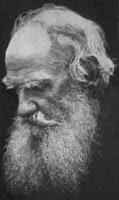
Oh, for God’s sake: Just when you thought publishing couldn’t get any sillier with the scrotum controversy and crasser with O.J. Simpson and Judith Regan, HarperCollins decides to trim down War & Peace and add a happy ending.
All in the name of reaching the “masses:”
A spokesman for HarperCollins predicted it would have mass appeal. "The new version is of course aimed at students of Tolstoy," she said. "But we are sure it will also prove fascinating to the general reader."
Bullsh*t. They don’t give a damn about reaching students or otherwise enriching the minds of “the general reader,” as the spokesperson so condescendingly puts it.
And how about this for advertising-cum-propaganda?
HarperCollins…describes the novel's brevity as "something to celebrate" while in Russia, the book is already being marketed as "half as long and twice as interesting" — despite the new book still running to a challenging 1,000 pages.
Any schools, any readers who allow HarperCollins to make one dime off this stunt are worse than fools. They are contributing further to our cultural demise. Maybe they'll PhotoShop Tolsty's photo, too, to make his looks more appealing to the masses. Give him a nose job and haircut and get rid of some of those wrinkles.
Hey, folks, it’s just another new frontier in the Land of Commodification. Why not ruin a piece of literature to make more money? Religion, wildlife -- hell, people sell their own psyches for a buck. Go out and make it a great day!!!
Other (happier) news
Call for papers for “Celebrating the Golden Age of Science Fiction.”
Sign up for Paul Cohelo’s newsletter, “Warrior of the Light Online.”
All in the name of reaching the “masses:”
A spokesman for HarperCollins predicted it would have mass appeal. "The new version is of course aimed at students of Tolstoy," she said. "But we are sure it will also prove fascinating to the general reader."
Bullsh*t. They don’t give a damn about reaching students or otherwise enriching the minds of “the general reader,” as the spokesperson so condescendingly puts it.
And how about this for advertising-cum-propaganda?
HarperCollins…describes the novel's brevity as "something to celebrate" while in Russia, the book is already being marketed as "half as long and twice as interesting" — despite the new book still running to a challenging 1,000 pages.
Any schools, any readers who allow HarperCollins to make one dime off this stunt are worse than fools. They are contributing further to our cultural demise. Maybe they'll PhotoShop Tolsty's photo, too, to make his looks more appealing to the masses. Give him a nose job and haircut and get rid of some of those wrinkles.
Hey, folks, it’s just another new frontier in the Land of Commodification. Why not ruin a piece of literature to make more money? Religion, wildlife -- hell, people sell their own psyches for a buck. Go out and make it a great day!!!
Other (happier) news
Call for papers for “Celebrating the Golden Age of Science Fiction.”
Sign up for Paul Cohelo’s newsletter, “Warrior of the Light Online.”
